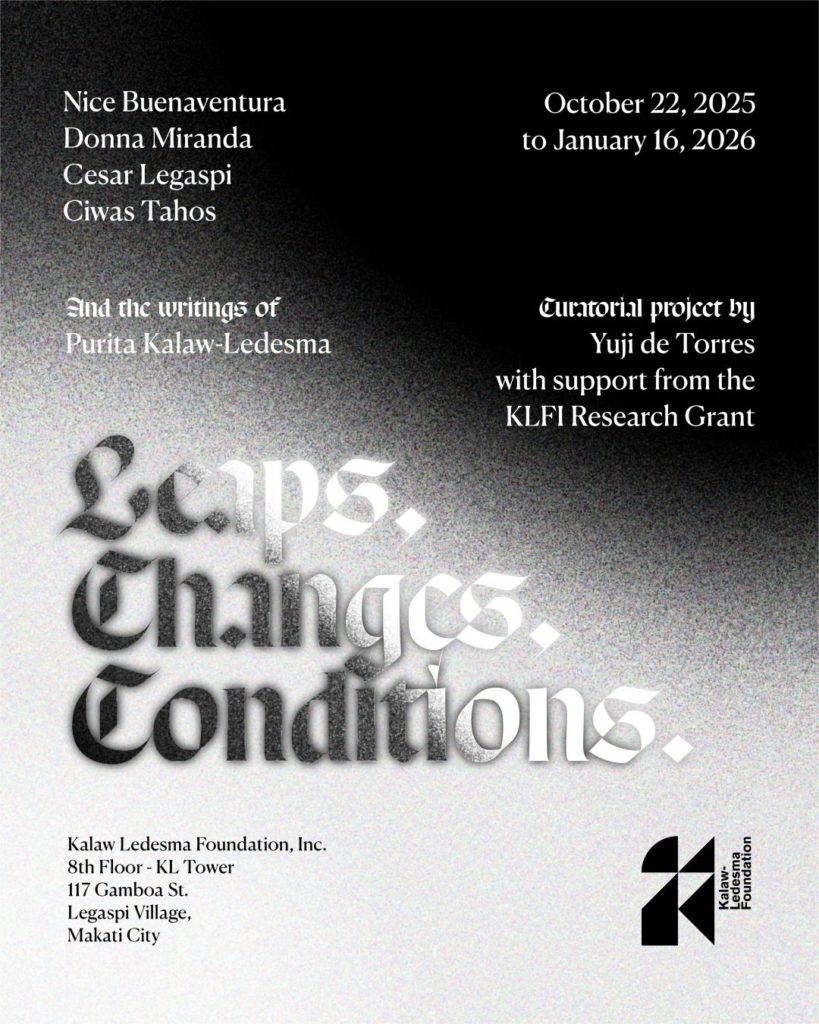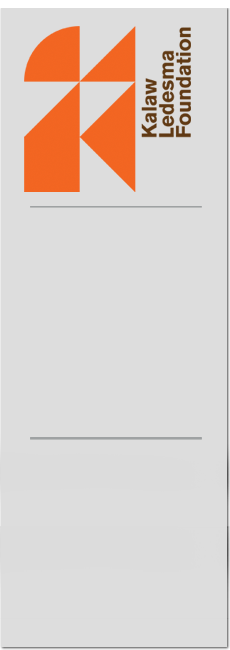
Leaps, Changes, Conditions
A project by Yuji de Torres, supported by the KLFI Research Grant
22 October 2025 – 16 January 2026
Purita Kalaw-Ledesma Center, Makati City
This curatorial research concerns motion, big and/or small, and its histories through artistic practices. It attempts to consider the necessities of artistic form and practice through the uncertainty of motion. Sited at the Purita Kalaw-Ledesma Center with a trove of materials on Philippine modern art, the project also locates an articulation of motion through the currents of modernity.
Purita Kalaw-Ledesma, born in 1914, was thirty-two years old when the Philippines received nominal independence from the United States in 1946. Her career is marked by stewarding Philippine Modernism through co-establishing the Art Association of the Philippines and encouraging and promoting young modernist artists. Through her writings, Purita articulated the development of a postwar modernism through the nascent postcolonial nation form. This development echoes the late curator Okwui Enwezor when he located postcolonial contemporary art in a “state of permanent transition.”[1] Thinking historically, anti-colonial movements in the Philippines referred to a motion that was a “step in the right direction”[2] towards a “day most eagerly awaited.”[3] What then is the history of this motion or motion in history?
Friedrich Engels, writing in 1877, noted that “motion is the mode of existence of matter.” [4] For Engels, along with his compatriot Karl Marx, there is no matter without motion and no motion without matter. While mass and energy are conserved, they transform from one form to another. In these transformations, however, qualitative leaps take place. They not only transform but also become something else entirely.
This curatorial research interrogates these qualitative leaps and changes, as well as their conditions, through artistic form and practice. It considers the struggle between material and artistic intervention in attempting to give form to motion. Rather than a postcolonial constellation, this project proposes a constellation of motion in which material and form become qualitative leaps into the open air of history. Through the works of artists Nice Buenaventura, Donna Miranda, Cesar Legaspi, and Ciwas Tahos, and the writings of Purita Kalaw-Ledesma, this curatorial research figures this constellation of motion between the human species, the postcolonial nation-state, and nature.
———
The exhibit is free and open to the public. To visit, please register first through this link: https://bit.ly/klfi-leaps-reg
For questions, please email contact@klfi.ph.
[1] Okwui Enwezor, “The Postcolonial Constellation: Contemporary Art in a State of Permanent Transition,” Research in African Literatures 34, no. 4 (Winter, 2003): 57-82.
[2] Salud Algabre, “Interview with Salud Algabre,” by David R. Sturtvent, in Popular Uprisings in the Philippines: 1840-1940 (Cornell University Press, 1976), 296.
[3] Hermano Pule (Apolinario de la Cruz) quoted in Reynaldo Ileto, Pasyon and Revolution: Popular Movements in the Philippines, 1840-1910 (Ateneo De Manila University Press, 1979), 36.
[4] Friedrich Engels, “Anti-Dühring,” in Karl Marx, Friedrich Engels: collected works (Progressive Publishers, 1987), 25:55.




